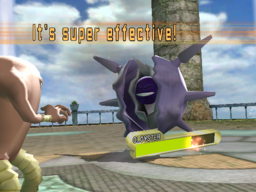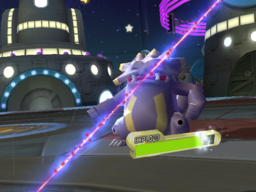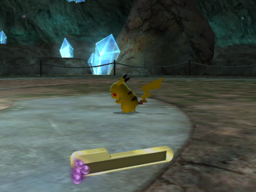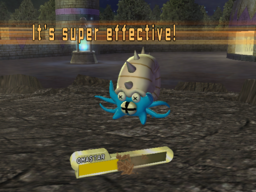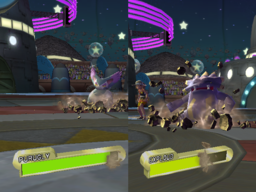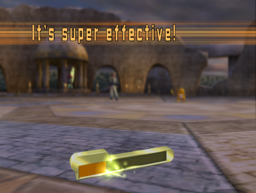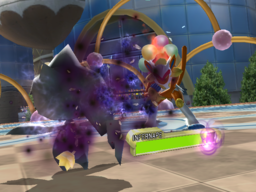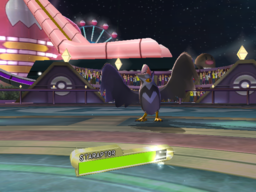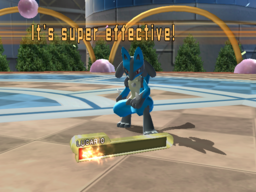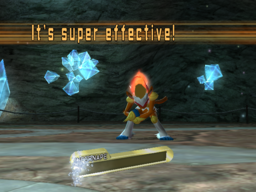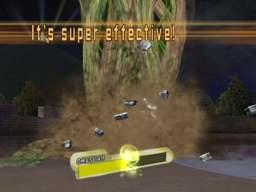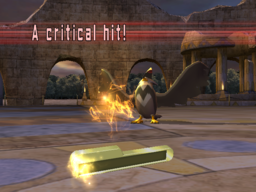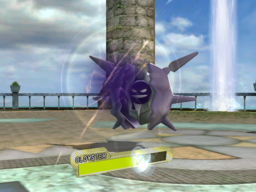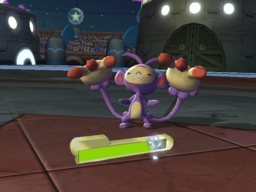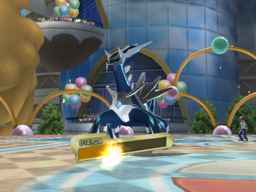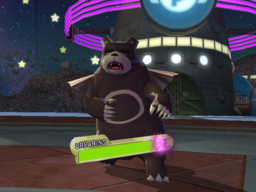Damage: Difference between revisions
(Undo revision 2605436 by Force Fire (talk)Discussed with Force Fire. The content of the change is fine.) |
m (→Type effectiveness: Moves aren't "resistant", Pokemon are. || If we're doing an exact quote of the games, my opinion is that we should use the <> structure that we use in the "Quotes" sections of other articles.) |
||
| Line 232: | Line 232: | ||
====Not very effective==== | ====Not very effective==== | ||
:''"Resistance" redirects here. For the TCG mechanic, see [[Appendix:Glossary (TCG)#Resistance|Appendix:Glossary (TCG) → Resistance]].'' | :''"Resistance" redirects here. For the TCG mechanic, see [[Appendix:Glossary (TCG)#Resistance|Appendix:Glossary (TCG) → Resistance]].'' | ||
When a move is '''not very effective''' (Japanese: '''{{tt|効果は今一つ|こうかはいまひとつ}}''' ''not very effective'') | When a move is '''not very effective''' (Japanese: '''{{tt|効果は今一つ|こうかはいまひとつ}}''' ''not very effective''), it deals half of the damage it would normally do and the target is considered "resistant" to attacks of that type. This works exactly like super effective moves, and can stack up. For example, a {{t|Steel}}/{{type|Rock}} Pokémon will be damaged by a quarter of the amount by a {{type|Normal}} move. Likewise, a {{t|Normal}}/{{type|Flying}} Pokémon hit by a {{type|Fighting}} move will be damaged normally, as Normal's weakness to Fighting is canceled out by Flying's resistance to it. | ||
In [[Pokémon GO]], not very effective moves deal 0.8x damage, instead of 0.5x. | In [[Pokémon GO]], not very effective moves deal 0.8x damage, instead of 0.5x. | ||
====Not effective==== | ====Not effective==== | ||
When a move is '''not effective''' (Japanese: '''{{tt|効果がない|こうかがない}}''' ''not effective''), it does not damage the Pokémon at all and that Pokémon is "immune" to all attacks of that type; the move will yield a message of "It doesn't affect ''Pokémon''..." Certain types are also immune to specific [[status move]]s, such as {{type|Ground}} Pokémon being immune to the {{type|Electric}} {{m|Thunder Wave}}, or {{type|Grass}} Pokémon being immune to {{m|Leech Seed}} as well as {{cat|powder and spore moves}}. | When a move is '''not effective''' (Japanese: '''{{tt|効果がない|こうかがない}}''' ''not effective''), it does not damage the Pokémon at all and that Pokémon is "immune" to all attacks of that type; the move will yield a message of "It doesn't affect ''<Pokémon>''..." Certain types are also immune to specific [[status move]]s, such as {{type|Ground}} Pokémon being immune to the {{type|Electric}} {{m|Thunder Wave}}, or {{type|Grass}} Pokémon being immune to {{m|Leech Seed}} as well as {{cat|powder and spore moves}}. | ||
In [[Pokémon GO]], not effective moves are treated as if they are not very effective. As an example, a {{type|Ground}} move can hit a {{type|Flying}} Pokémon, only at 0.8x damage. | In [[Pokémon GO]], not effective moves are treated as if they are not very effective. As an example, a {{type|Ground}} move can hit a {{type|Flying}} Pokémon, only at 0.8x damage. | ||
Revision as of 14:29, 27 February 2017

Damage (Japanese: ダメージ damage) is a loss of a Pokémon's HP that happens as the result of a physical or special attack used against it by another Pokémon.
Damage calculation
Except for moves that deal direct damage, the damage dealt when a Pokémon uses a damaging move depends on its level, its effective Attack or Special Attack stat, the opponent's effective Defense or Special Defense stat, and the move's effective power. In addition, various factors of damage modification may also affect the damage dealt.
More precisely, damage is calculated as
where
- Level is the level of the attacking Pokémon (or twice the level for a critical hit in Generation I).
- A is the effective Attack stat of the attacking Pokémon if the used move is a physical move, or the effective Special Attack stat of the attacking Pokémon if the used move is a special move.
- D is the effective Defense stat of the defending Pokémon if the used move is a physical move or a special move that uses the defending Pokémon's Defense stat, or the effective Special Defense of the defending Pokémon if the used move is an other special move.
- Power is the effective power of the used move.
and Modifier is
where
- Targets is 0.75 if the move has more than one target, and 1 otherwise.
- Weather is 1.5 if a Water-type move is being used during rain or a Fire-type move during harsh sunlight, and 0.5 if a Water-type move is used during harsh sunlight or a Fire-type move during rain, and 1 otherwise.
- Badge is applied in Generation II only. It is 1.25 if the attacking Pokémon is controlled by the player and if the player has obtained the Badge corresponding to the used move's type, and 1 otherwise.
- Critical is applied starting in Generation II. It is 2 for a critical hit in Generations II-V, 1.5 for a critical hit from Generation VI onward, and 1 otherwise.
- random is a random factor between 0.85 and 1.00 (inclusive):
- From Generation III onward, it is a random integer percentage between 0.85 and 1.00 (inclusive)
- In Generations I and II, it is realized as a multiplication by a random uniformly distributed integer between 217 and 255 (inclusive), followed by an integer division by 255
- STAB is the same-type attack bonus. This is equal to 1.5 if the move's type matches any of the user's types, 2 if the user of the move additionally has Adaptability, and 1 if otherwise.
- Type is the type effectiveness (as detailed below). This can be 0 (ineffective); 0.25, 0.5 (not very effective); 1 (normally effective); 2 or 4 (very effective) depending on both the move's and defending Pokémon's types.
- Burn is 0.5 (from Generation III onward) if the attacker is burned, its Ability is not Guts, and the used move is a physical move (other than Facade from Generation VI onward), and 1 otherwise.
- other is 1 in most cases, and a different multiplier when specific interactions of moves, Abilities or items take effect:
Move Value Detail Astonish 2 In Generation III only, if the used move, and the defender has previously used Minimize Aurora Veil 0.5 * If set on the defender's side, the move is not a critical hit, and the user's Ability is not Infiltrator Body Slam 2 From Generation VI onward, if the used move, and the defender has previously used Minimize Bulldoze 0.5 If the used move, and the defender is affected by Grassy Terrain Dragon Rush 2 From Generation VI onward, if the used move, and the defender has previously used Minimize Earthquake 0.5 If the used move, and the defender is affected by Grassy Terrain 2 From Generation V onward, if the used move, and the defender is in the semi-invulnarable turn of Dig Extrasensory 2 In Generation III only, if the used move, and the defender has previously used Minimize Flying Press 2 If the used move, and the defender has previously used Minimize Heat Crash 2 From Generation VI onward, if the used move, and the defender has previously used Minimize Heavy Slam 2 In Generation VII, if the used move, and the defender has previously used Minimize Light Screen 0.5 * Form Generation III onward, if set on the defender's side, the move used is special, not a critical hit, and the user's Ability is not Infiltrator Magnitude 0.5 If the used move, and defender is affected by Grassy Terrain 2 From Generation V onward, if the used move, and the defender is in the semi-invulnarable turn of Dig Misty Terrain 0.5 If the defender is affected by it, and the used move is Dragon-type Needle Arm 2 In Generation III only, if the used move, and the defender has previously used Minimize Phantom Force 2 If the used move, and the defender has previously used Minimize Reflect 0.5 * From Generation III onward, if set on the defender's side, the move used is physical, not a critical hit, and the user's Ability is not Infiltrator Shadow Force 2 If the used move, and the defender has previously used Minimize Sniper 1.5 If the attacker has this Ability and the move was a critical hit Solid Rock 1.5 If the defender has this Ability and the move was super effective (Type > 1) Stakeout 2 If the attacker has this Ability and the target has switched in Stomp 2 In Generation III and from Generation V onward, if the used move, and the defender has previously used Minimize Surf 2 From Generation V onward, if the used move, and the defender is in the semi-invulnarable turn of Dive Whirlpool 2 From Generation V onward, If the used move, and the defender is in the semi-invulnarable turn of Dive Z-Moves 0.25 If the used move is a damaging Z-Move the target has protected against
Ability Value Detail Fluffy 0.5 If the defender has this Ability, and the used move makes contact and is not Fire-type 2 If the defender has this Ability, and the used move is Fire-type and does not make contact Filter 1.5 If the defender has this Ability and the move was super effective (Type > 1) Friend Guard 0.75 If an ally of the defender has this Ability Misty Surge 0.5 If the defender is affected by it, and the used move is Dragon-type Multiscale 0.5 If the defender has this Ability and is at full health Shadow Shield 0.5 If the defender has this Ability and is at full health Sniper 1.5 If the attacker has this Ability and the move was a critical hit Solid Rock 1.5 If the defender has this Ability and the move was super effective (Type > 1) Stakeout 2 If the attacker has this Ability and the target has switched in Tinted Lens 2 If the attacker has this Ability and the move was not very effective (Type < 1)
Item Value Detail Chilan Berry 0.5 If held by the defender, the move was Normal-type Expert Belt ~1.2 If held by the attacker and the move was super effective (Type > 1) Life Orb ~1.3 If held by the attacker Metronome >1 1 + (~20% per successfully used successive move) if held by the attacker, but no more than 2 Type-resist Berries 0.5 If held by the defender, the move was of the resisted type and super effective
- If multiple effects influence the other value, their values usually stack multiplicatively. For example, if both Multiscale and a Chilan Berry take effect, other is
0.5 * 0.5 = 0.25.
During the calculation, any operations are carried out on integers internally, such that effectively each division is a truncated integer division (rounding towards zero, cutting off any decimals), and any decimals are cut off after each multiplication operation. If the calculation yields 0, the move will deal 1 HP damage instead; however, in Generations I and V, different behavior may occur due to apparent oversights:
- In Generation I, if the calculation yields
0because the target has two types that both resist the move's type, the move will miss as if it was ineffective; - In Generation V, a move may deal 0 HP damage when other is less than
1, because the routine to prevent 0 HP damage is erroneously performed before applying the other factor.
Type effectiveness
Since each move has a type, its effectiveness (Japanese: 効果 effectiveness) is largely determined by the targeted Pokémon's type. Moves can have regular effectiveness or be super effective, not very effective, or not effective at all. The effectiveness of types against one another has varied among generations, see this page.
Super effective
- "Super effective" redirects here. For the webcomic, see Super Effective (webcomic).
- "It's super effective" redirects here. For the podcast, see It's Super Effective (podcast).
- "Weakness" redirects here. For the TCG mechanic, see Appendix:Glossary (TCG) → Weakness.
When a move is super effective (Japanese: 効果はバツグン super effective), it inflicts double the damage it would normally do. For example, a move like Megahorn used against a Psychic-type Pokémon will be super effective because Bug-type moves are super effective against Psychic types. This effect can stack up; for example, a Pokémon that is Rock/Ground-type and is hit by a Water-type move like Surf will be damaged four times as much by the move as a Normal-type Pokémon would be, because both Rock and Ground Pokémon are weak to Water moves.
In Pokémon GO, super effective moves deal only 1.25x the damage, instead of 2x.
Not very effective
- "Resistance" redirects here. For the TCG mechanic, see Appendix:Glossary (TCG) → Resistance.
When a move is not very effective (Japanese: 効果は今一つ not very effective), it deals half of the damage it would normally do and the target is considered "resistant" to attacks of that type. This works exactly like super effective moves, and can stack up. For example, a Steel/Rock-type Pokémon will be damaged by a quarter of the amount by a Normal-type move. Likewise, a Normal/Flying-type Pokémon hit by a Fighting-type move will be damaged normally, as Normal's weakness to Fighting is canceled out by Flying's resistance to it.
In Pokémon GO, not very effective moves deal 0.8x damage, instead of 0.5x.
Not effective
When a move is not effective (Japanese: 効果がない not effective), it does not damage the Pokémon at all and that Pokémon is "immune" to all attacks of that type; the move will yield a message of "It doesn't affect <Pokémon>..." Certain types are also immune to specific status moves, such as Ground-type Pokémon being immune to the Electric-type Thunder Wave, or Grass-type Pokémon being immune to Leech Seed as well as powder and spore moves.
In Pokémon GO, not effective moves are treated as if they are not very effective. As an example, a Ground-type move can hit a Flying-type Pokémon, only at 0.8x damage.
Example
Imagine a level 75 Glaceon that does not suffer a burn and holds no item with an effective Attack stat of 123 uses Ice Fang (an Ice-type physical move with a power of 65) against a Garchomp with an effective Defense stat of 163 in Generation VI, and does not land a critical hit. Then, the move will receive STAB, because Glaceon's Ice type matches the move's: STAB = 1.5. Additionally, Garchomp is Dragon/Ground, and therefore has a double weakness to the move's ice type: Type = 4. All other (non-random) factors of Modifier will be 1. This effectively gives
When also plugging in Glaceon's effective Attacks stat and Garchomp's effective Defense stat, the whole damage formula gives
That means Ice Fang will do between 168 and 198 HP damage, depending on luck.
If the same Glaceon holds a Muscle Band and its Ice Fang lands a critical hit against Garchomp, it will be Critical = 1.5, effectively giving
Furthermore, Ice Fang's effective power will be boosted by the Muscle Band by (approximately) 10% to become 71, leading the whole formula to give
That means Ice Fang will now do between 268 and 324 HP damage, depending on luck.
Trivia
- The highest potential damage dealt in a single attack can be achieved by Shuckle using Ice Ball.
- In Pokémon Battle Revolution, the HP bar will change with a different animation depending on the move's type (recovery, recoil damage and indirect damage use the Normal-type animation), as shown below.
|
In other languages
| |||||||||||||||||||||||||||||||||||||||||||||||
External links
References

|
This game mechanic article is part of Project Games, a Bulbapedia project that aims to write comprehensive articles on the Pokémon games. |

